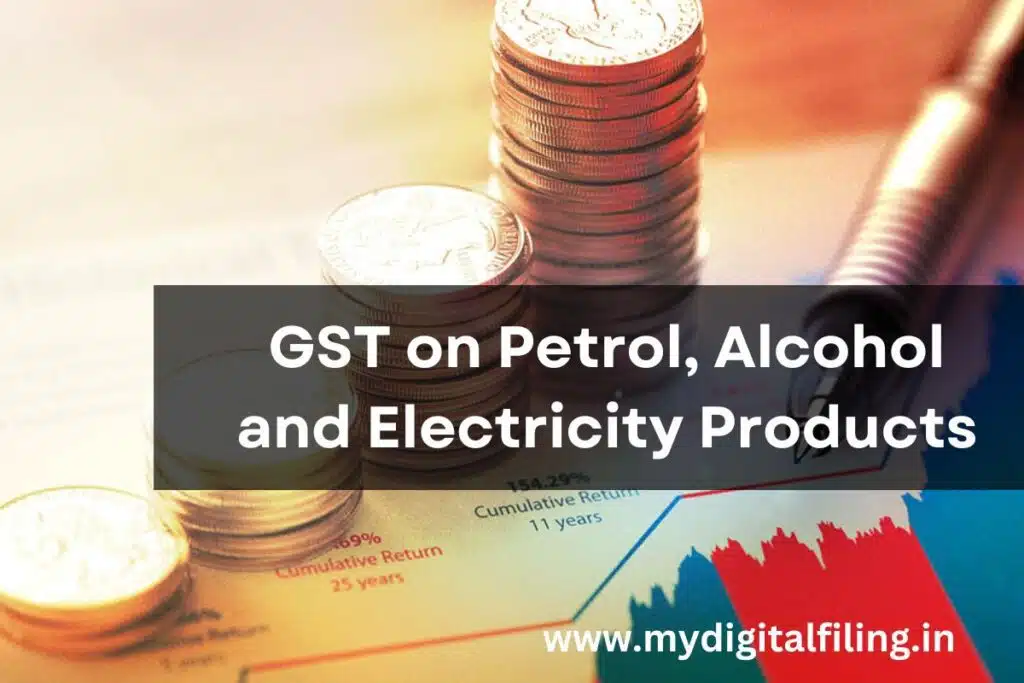
Garima Agrawal
Unveiling the GST Revolution: A Closer Look at Petroleum Products, Alcoholic Beverages, and Electricity
In the world of taxation, some everyday essentials stand apart, and we’re about to unravel their unique tax story. Presenting the intriguing realm of Goods and Services Tax (GST) and its impact on petroleum products, alcoholic beverages, and electricity – the trio that doesn’t fall under the GST umbrella.
Table of Contents
1. Introduction
2. How Can GST Benefit Petroleum Products?
3. Challenges in Bringing Petroleum Products Under GST
4. How could GST improve the situation?
5. The Hurdles in GST Implementation for Alcoholic Beverages.
6. How Could GST Impact Electricity?
The Uncovered Essentials
PETROLEUM PRODUCTS
Introduction: Let’s kick things off by diving headfirst into the world of taxation and its effects on our everyday essentials. As it stands, products like crude oil, petrol, diesel, natural gas, and aviation turbine fuel remain beyond the grasp of the Goods and Services Tax (GST) system. Instead, they’re governed by their own set of taxes, namely central excise duty and state value-added tax (VAT).
How Can GST Benefit Petroleum Products?
✅ Lighter Load for Consumers: Imagine a world where these petroleum products were brought under the GST umbrella. It would mean just one tax to deal with, replacing the current tangle of multiple taxes. A breath of fresh air for everyday consumers!
✅ A Clearer Picture: GST is celebrated for its transparency and accountability. Inclusion of these products in the GST system would pave the way for a clearer and more straightforward tax process.
✅ Frustrating Tax Evasion: With the introduction of GST, businesses attempting to evade taxes on these products would face a tougher challenge. Great news for the government, as it promises a boost in their tax revenue.
Challenges in Bringing Petroleum Products Under GST
❌ A Hit to Government Revenues: For both central and state governments, folding these products into GST would mean parting with a slice of their hard-earned tax income. Finding ways to compensate for this potential loss is an essential puzzle to solve.
❌ A Puzzle of Regulations: The real challenge lies in harmonizing the existing state-specific laws and regulations governing these products under a unified GST system. It’s like fitting pieces of a complex jigsaw puzzle together.
❌ Balancing Act: To avoid inflation and public unrest, the potential price increase in these products due to GST implementation must be meticulously managed. It’s a delicate balancing act.
ALCOHOLIC BEVERAGES
How Could GST Improve the Situation?
✅ Streamlined Taxation: Bringing alcoholic beverages under the GST umbrella simplifies the tax structure by replacing multiple state taxes with one uniform tax. A refreshing change for consumers and businesses alike.
✅ A Boost in Revenue: The inherent transparency and accountability of GST can significantly reduce tax evasion, thus leading to an increase in government tax revenues. Cheers to that!
✅ Fostering Economic Growth: Businesses can thrive when they can claim input tax credits on the taxes they pay on inputs. This stimulus, in turn, propels economic growth.
The Hurdles in GST Implementation for Alcoholic Beverages
❌ Resistance from State Governments: State governments heavily rely on the revenue generated from alcoholic beverages. Their reluctance to let go of this income source poses a considerable challenge in implementing GST for these beverages.
❌ The Web of Regulations: The complex web of state-specific laws governing alcoholic beverages makes unifying them under a single GST system quite the Herculean task. It’s like untangling a knotty problem.
ELECTRICITY
How Could GST Impact Electricity?
✅ A Consistent Approach: Bringing electricity into the GST framework introduces consistent taxation rules, making it simpler for all parties involved. It’s like turning on the lights in a room filled with complexities.
✅ Shining a Light on Transparency: The transparency and accountability of GST would cast a more favorable light on the taxation of electricity. It’s like bringing sunshine into a cloudy situation.
The Challenges of Implementing GST for Electricity
❌ Affordability Concerns: Electricity is a fundamental necessity, and the government’s aim is to keep it affordable for all. Implementing GST must consider this to avoid price increases that could burden consumers.
❌ The Regulatory Conundrum: Much like petroleum and alcoholic beverages, electricity is subject to a patchwork of state-specific laws and regulations. Harmonization is a formidable task, akin to merging various threads into one seamless tapestry.
The Path to Implementation
The journey towards implementing GST on these essential products involves meticulous analysis of existing taxation structures, the creation of a standardized framework, and the careful calibration of tax rates to ensure consumers are not unduly burdened.
In Conclusion
The decision to embrace GST for petroleum products, alcoholic beverages, and electricity is a complex one. While it offers potential benefits like reduced tax burdens, increased transparency, and improved revenue collection, challenges such as potential revenue loss, administrative complexities, and the need to prevent inflation are roadblocks that must be carefully navigated. As the GST Council deliberates, a judicious weighing of the pros and cons is of utmost importance.
Five Unique FAQs:
Are petroleum products currently under GST?
No, petroleum products have their separate taxation system, including central excise duty and state VAT.
How will GST benefit consumers with petroleum products?
GST would simplify taxation, reducing the overall tax burden on consumers.
Why are state governments hesitant to bring alcoholic beverages under GST?
State governments heavily rely on the tax revenue from alcoholic beverages and are reluctant to lose this income source.
How can the government manage inflation when implementing GST on these products?
Careful rate calibration and effective management can help prevent significant price increases and potential inflation.
What’s the primary challenge in bringing electricity products under GST?
Ensuring that electricity remains affordable for consumers, as it’s a fundamental necessity.
It’s a transformative journey, with potential pitfalls and promises. Stay tuned for the evolution of GST and its impact on these essential facets of our lives.



